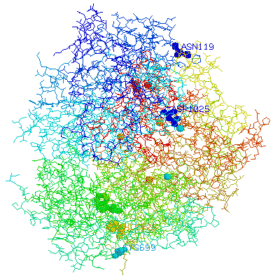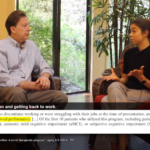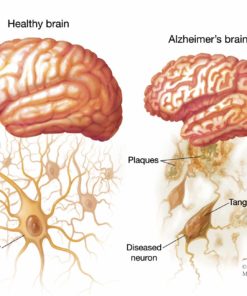This video interviews Dale E. Bredesen, M.D., a neurology professor at the Easton Laboratories for Neurodegenerative Disease Research at UCLA. He has identified several subtypes of Alzheimer's disease and developed the ReCODE protocol that reverses cognitive decline in patients with mild cognitive impairment and Alzheimer’s disease.
ApoE4 Gene: The Biggest Risk Factor for Alzheimer's Disease
Dr. Bredesen states that the biggest risk factor for Alzheimer's Disease is whether or not you have any copies of the ApoE4 gene. Everyone has two copies of the ApoE gene, and it is either ApoE2, ApoE3, or ApoE4. Around 75 million Americans have a single copy of ApoE4, which increases their lifetime risk of developing Alzheimer's disease by about 30%. About 7 million Americans have two copies of ApoE4, which increases their lifetime risk of developing Alzheimer's disease by over 50%. You can test your ApoE phenotype with 23andMe.
Prevention of Alzheimer's Disease
Dr. Bredesen suggests several ways to prevent Alzheimer's disease. These include eating a low inflammatory diet, exercising, limiting exposure to mold and mycotoxins, keeping an eye on copper and zinc levels (as a high copper/zinc ratio is not good), avoiding mercury exposure by eating wild-caught fish, and eating organic to avoid toxins.
Reversal of Cognitive Decline
To reverse cognitive decline, Dr. Bredesen recommends following a mild ketogenic diet, fasting for a minimum of 12 hours each night, and using the sauna to sweat out toxins like cadmium, mercury, and BPA. Dr. Bredesen’s ReCODE protocol evaluates 150 factors known to contribute to Alzheimer’s disease, identifying your disease subtype or combination of subtypes, and devising an effective treatment protocol.
Alzheimer's Subtypes
Dr. Bredesen has identified several subtypes of Alzheimer's disease based on metabolic profiling. These include type 1, inflammatory ("hot") Alzheimer’s, type 1.5, glycotoxic (sugar-toxic, "sweet"), a mixed subtype, type 2, atrophic or “cold” Alzheimer’s, and type 3, toxic (“vile”) Alzheimer’s. The ReCODE protocol can identify these subtypes and determine an effective treatment plan.
The Cognoscopy
Dr. Bredesen recommends that everyone over age 45 get a "cognoscopy," which is a set of blood tests to assess risk factors associated with the three major causes of Alzheimer's. Protecting ourselves and initiating therapies as early as possible can eradicate Alzheimer's disease.
ReCODE: The Reversal of Cognitive Decline
Bredesen's Cognoscopy Test elements and target ranges to optimize brain health
| Test | Recommended range |
| Ferritin | 40 to 60 ng/mL |
| GGT | <16 U/L for men and < 9 U/L for women |
| 25-hydroxy vitamin D | 40 to 60 ng/mL |
| High-sensitivity CRP | <0.9 mg/L |
| Fasting Insulin | < 4.5 mg/dL |
| Omega-3 index and Omega 6:3 ratio |
Omega-3 index > 8 % |
| TNF alpha | < 6.0 |
| TSH | Less than 2.0 microunits/mL |
| Free T3 | 3.2-4.2 pg/mL |
| Reverse T3 | <20 ng/mL |
| Free T4 | 1.3-1.8 ng/mL |
| Serum copper and zinc ratio | 0.8-1.2 |
| Serum selenium | 110-150 ng/mL |
| Glutathione | 5.0-5.5 μm |
| Vitamin E (alpha tocopherol) | 12-20 mcg/mL |
| Body mass index | 18-25 |
| ApoE4 (DNA test) | See how many alleles you have: 0, 1 or 2 |
| Vitamin B12 | 500-1,500 |
| Hemoglobin A1c | Less than 5.5 |
| Homocysteine | 4.4-10.8 mcmol/L |
Posts on Alzheimer's | Oxidative Stress from Copper Overload
Cognoscopy Lab Test Panels
All Cognoscopy Labs
All Cognoscopy Labs
Cognoscopy #4 – Leaky Gut / Celiac Lab Tests (Zonulin, IgA/G, tTG)
All Cognoscopy Labs
All Cognoscopy Labs
All Cognoscopy Labs
Cognoscopy Panel #3 – Testing Glucose, Lipids and Inflammation
All Cognoscopy Labs






